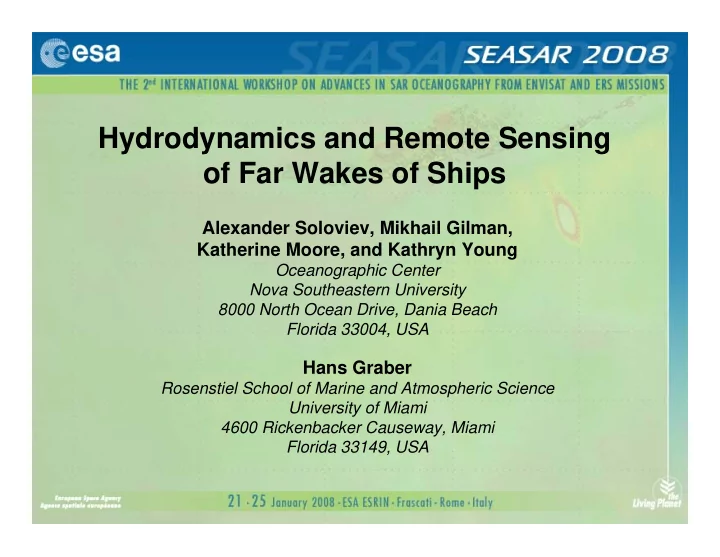

Hydrodynamics and Remote Sensing of Far Wakes of Ships Alexander Soloviev, Mikhail Gilman, Katherine Moore, and Kathryn Young Oceanographic Center Nova Southeastern University 8000 North Ocean Drive, Dania Beach Florida 33004, USA Hans Graber Rosenstiel School of Marine and Atmospheric Science University of Miami 4600 Rickenbacker Causeway, Miami Florida 33149, USA
Introduction The problem of remote ship detection attracts much attention due to its importance for fishing and pollution control, global security, marine navigation safety, and other applications. SAR images of ship wakes is a source of data for the ship monitoring. A big uncertainty of wakes visibility, size, and features complicates the operational utilization for ship identification.
Ship Wake Structure Ship wakes have a complex structure and may have one or more of the following elements: • Centerline wake • Kelvin arms, and Kelvin wake area • V-like structures • Internal wave features generated by the ship
SAR Imaging of Ship Wake Ship hull Current gradient and screws SAR Bragg-scattering Upper Slick algorithm surface waves ocean Environment Turbulence (wind, Image of waves) wake and background conditions Effects of stratification, long/short wave modulation, coherent structures add more complexity.
Ferry Le Méditerranée and its wake in SAR 7.76 km N • Date: October 30, 2006 • Time: 10:21:27 GMT • Satellite: ERS-2 • Image Mode: SAR • Polarization: VV 7.46 km • Latitude: 43.008 ° • Longitude: 5.462 ° • Ship Course: 339.17° • Ship Speed: 11.6 m/s • Wind Speed: 3.2 m/s • Wind Direction: 61.17°
Inverse problem would benefit from proper physical models of ship wake, sea surface, and selecting adequate radar imaging modes Recent status of the problem: • No comprehensive hydrodynamic theory of far wakes of ships exists • Ship-wake dependence on ship parameters and the effects of environmental conditions are not well understood • Optimal parameters for SAR imaging of ship wakes (angle, band, polarization) have not been finally determined • Satellite SAR images found in literature typically refer to unidentified ships and unknown hydrometeorological conditions
Our Experimental Approach Ships equipped with hydro-meteorological sensors can provide ground truth information : 1) UM RSMAS : Royal Caribbean Explorer of the Seas 2) ISKS: Ferry Le Méditerranée , Container Ship Polk , Carnival Cruises Ship Spirit, Holland America Amsterdam
Camera Installation on the Explorer
Camera Locations on Explorer B A
A Caribbean Track of Explorer of the Seas
SAR and Photo Imaging of Explorer ’s Wake RADARSAT-1 05/21/2007, 10:51 UTC, 37.6 o N, 70.3 o W Wind: 8 m/s, 314 o , ship: 11 m/s, 133.2 o
Examples of wake One Year Image Collection Statistics photo-images at different wind speeds 4.4 ms -1 9.5 ms -1 13.1 ms -1
Explorer’ s Wake at a Low Wind
Wake Asymmetry: Wind from Right to Left Jul 23, 2007 18:30 UTC 25.3 o N 64:06 o W Ship: 22.8kt 177deg Wind: 18.5kt 82deg
Wake Asymmetry: Wind from Left to Right 12-Jul-07 19:56 UTC 18.949 o N - 66.2726 o W Ship: 21.8kt 345.4 o Wind: 22.9kt 96.7 o EX0728B0146
Ship Wake Asymmetry Explorer of the Seas wake asymmetry statistics: number of images where only the starboard (port) wake boundary is sharp (left and right plate, respectively). Horizontal axis: ship course relative to wind direction, degs, 0 is upwind course, positive values correspond to the wind from port side. Winds > 5 m s-1
Image Processing Contrasting Digitizing, correction for Earth’s curvature, correction for refraction
Wake width versus distance from the ship
Quite Unusual Wake: Internal Waves? 01/23/2007 Date: 14:20 Time (UTC): Lat: 19.38 o N 67.28 o W Lon: Ship speed: 21.5 kt 127.3 o Ship course: Wind speed: 9.8 kt 69.6 o Wind dir:
Hydrodynamics of Far Wakes of Ships Working Hypothesis: Far wakes of ships are controlled by coherent structures developing due to contribution from the hull and, ship probably, depend on the number of screws convergence wind Scaling law for the dependence of zones wake width W on the distance x : ∼ 1/5 W x strong mixing suppressed mixing An attempt to include ship beam width B : AxB α − α = ( 1) 1 ( ) ( ) W x counter-rotating vortex pair A is dimensionless proportionality constant, α varies from 4 to 7.
A model of the far wake with a point source ( ) = ρ W function P , , , x U g , where: W - ship wake width P - propulsion power of the ship ρ - water density x - distance form the ship U – ship speed g – acceleration due to gravity Ignoring Froude number dependence: 2/5 ⎛ ⎞ W P ≈ C ⎜ ⎟ ρ 3 2 ⎝ ⎠ x U x
CFD Fluent
Velocity Field: Initial Conditions
Convergence (blue) and divergence zones (red) after 100 s of simulation
10 m s -1 wind Wind from right to left
Conclusions • Introduction of a new generation of SAR satellites (TerraX, COSMO- Skymed, Radarsat-2, Sentinel-1) opens an opportunity to investigate fine features of ship wakes and, thus, in combination with in-situ measurements and numeric simulations, allow the development of improved inverse algorithms aimed at ship identification • Using ground truth data is greatly facilitated by ship-borne hydro- meteorological laboratories. • An early result of this project is ship wake asymmetry due to wind- wake interaction, which may appear on high resolution SAR images. Next Steps • Planning future acquisitions of SAR images of ships with hydro-met labs including new SAE satellites • Numerical modeling and conducting field observations in the wake
Acoustic Imaging of Ship Wakes VideoRay MicroROV with BlueView acoustic Imager
Test with a Multibeam Sonar Key Largo, FL, November 7, 2007 with the help of Don Draper (UI Technologies), Steve Van Meter (VideoRay Inc.), and BlueView Inc.
Thank you!
Recommend
More recommend